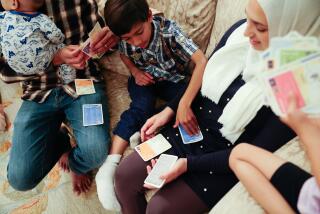Christian Schools Mark Holidays Despite Students’ Differing Faiths
- Share via
As the mammoth pipe organ swelled to “Angels We Have Heard on High,” a self-proclaimed atheist crossed her arms, stood up reluctantly with her classmates and kept quiet. Down the pew, choosing to sing the Christmas chestnut, was a classmate whose family practices Jainism, an Indian religion.
December is the time at Christian private schools for lessons and carols, for Advent wreaths and archangels--whether you’re Christian, Jewish, Muslim, Hindu or still sampling religions. Although some prep schools remain enclaves for certain faiths and cultures, other religiously affiliated schools enroll students of all traditions while making no apologies for holding to the schools’ holiday heritages.
“Most schools, even though they may want to ground children of that tradition in that tradition, they still acknowledge they’re going to have to live with others,” said Peter Cobb, executive director of the Council for Spiritual and Ethical Education in Atlanta.
At the First Congregational Church’s Pilgrim School in Wilshire Center, 375 students gathered this week in the Gothic sanctuary, where red ribbons cascaded from wreaths of evergreens and sprigs of holly formed the crucifix. The church’s enormous organ provided accompaniment for “O Come, All Ye Faithful.” And joining in for “Silent Night,” on bass guitar, was Alexei Klein, whose family celebrates Hanukkah and Christmas.
“When I was young, I kind of hated” weekly chapel services at Pilgrim, he said. “But now I kind of like it. I like singing.”
Jesse Levitt, whose parents are Jewish, said he, too, doesn’t mind taking part in another religion’s traditions.
“I look at it this way: Any faith is good faith,” the 16-year-old junior said. “So I just go along with anything.”
Many families with the same feelings choose private religious schools, said Cobb, whose group counsels nearly 400 schools nationwide on how to incorporate spirituality and ethics into their programs.
“Those [parents] who have a significant faith tradition at times would rather their child be at a school that honors religion--even if it’s a different religion--than at a school that dismisses or marginalizes or doesn’t acknowledge religion,” he said.
Religious schools have opened up to other faiths in the last few decades, and the religious curriculum has been broadened to teach moral lessons that can be applied regardless of denomination.
“Virtually every school I know that has a religious identification has students and families and faculty of other faith traditions,” Cobb said.
The religions represented at Catholic schools are “all over the map,” he said. Protestant schools have also diversified. Students at Jewish and Islamic schools, however, are almost always of those faiths.
The Congregational church is among Protestantism’s less rigid sects: no creeds, no canon law, no church hierarchy and a continuing tradition of religious independence as embodied by the pilgrims of 1620. So Pilgrim School is not uncomfortable for adherents of other religions--or those students who denounce all faiths. Just be prepared to defend what you believe.
“They question our beliefs, and we question theirs,” said sophomore Rochelle Mayerson, whose father is Jewish but considers herself a Christian, like her mother.
Going to school with students who have other beliefs has made Crystal Houston more certain she is Christian, she said.
“The more people contradict my religion, the stronger I’ve become in my faith,” the 16-year-old sophomore said.
Several of Pilgrim’s high school students said they are still shopping around for a religion. Autumn Koller calls herself an atheist. During Pilgrim’s chapel services, “I just sit here quietly, not doing anything,” she said. Autumn’s parents were raised Mormon and Catholic.
“If I chose a faith at any time, they’d be happy to support me in it,” she said. “I just don’t think Christianity is the one, at least not this kind.”
Like a lot of religiously affiliated schools, Pilgrim brings in representatives of other faiths to talk about their beliefs and practices. But as accepting as the Congregational school is of other backgrounds, the students said such presentations still seem token.
“After all, this is a Christian school,” said Harry Sa, a junior who helped start Pilgrim’s club for Christians. “Bringing in a Jewish rabbi or a Buddhist monk, it kind of seems out of place.”
More to Read
Sign up for Essential California
The most important California stories and recommendations in your inbox every morning.
You may occasionally receive promotional content from the Los Angeles Times.













